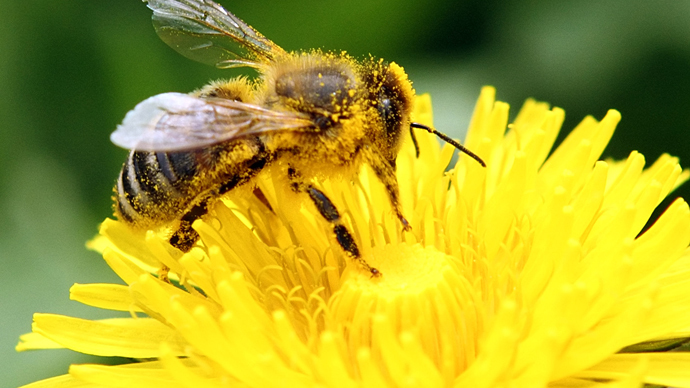'Bees with Alzheimer’s?' Aluminium pollution linked to dementia in bees

The decline in the bee population could be caused by the insect’s high contamination of aluminum, a chemical element implicated as a factor in Alzheimer's disease in humans, a new study has found.
It's believed that a number of factors are likely to be involved in the decline of bees: from a lack of flowers to attacks by parasites. But biologists at Keele University and the University of Sussex in the UK decided to find out whether aluminum, the "most significant environmental contaminant of recent times," could prove to play the key role in the insect’s decline.
READ MORE: 40 percent of US honeybee population lost over year, as mysterious die-off accelerates
Previous research had suggested that when bees forage for nectar they don't avoid nectar which contains aluminum. So researchers measured the content of aluminum in bee pupae taken from naturally foraging colonies in the UK.
They found levels of the metal content in bee pupae that ranged from 13 to 193 ppm [parts per million.] In humans, brain aluminium content in excess of 3 ppm "might be considered as pathological with possible contributions towards neurodegenerative disease including Alzheimer’s disease," the study, published in the journal PLOS One, said.
READ MORE: World’s first ‘bumblebee highway’ opened in Norway
Researchers say that a number of human activities, such as the burning of fossil fuels resulting in “acid rain” and the mining of aluminium ores to make aluminum metal and salts, have contributed to the thriving biological availability of this "non-essential metal."
As a result, fish, trees, crops and humans have all been affected by aluminium. Evidence suggests that bees are not immune to its increasing prevalence, with analysis from Brazil having previously indicated that "pollen is heavily contaminated with aluminium."
“Aluminum is a known neurotoxin affecting behaviour in animal models of aluminum intoxication. Bees, of course, rely heavily on cognitive function in their everyday behaviour and these data raise the intriguing spectre that aluminium-induced cognitive dysfunction may play a role in their population decline – are we looking at bees with Alzheimer’s disease?”said Professor Chris Exley, a leading authority on human exposure to aluminium, from Keele University.












